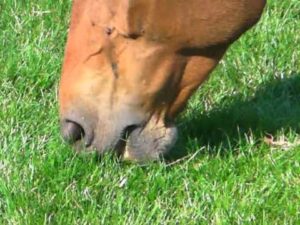
Feed small amounts of feed as frequently as possible. This is how horses are designed to eat.
- Feed as much fresh grass as possible during the entire year. Grass is very easily digestible and acts as a natural laxative. Be careful about putting horses out on fresh spring pasture for an extended time.
- Try to match the horse’s energy intake with his/her energy expenditure. Overweight horses are more prone to development of problems such as certain types of colic, laminitis, decreased performance, etc. An easy way to determine the horse’s normal weight is to use the ribs as a guideline:
– Normal horses: the ribs are not visible but are easily palpable (felt with fingers).
– Overweight horses: the ribs are not visible and are not palpable.
– Underweight horses: the ribs are always visible. - Note that the level of protein intake is not necessarily proportional to the amount of energy intake. In fact, fat provides much more energy per gram than protein.
- Use caution when feeding Bermuda Coastal Grass hay. This hay is very palatable and is an excellent source of nutrition. However, it has been associated with the development of distal ileal (small intestinal) impactions, which often warrant surgical correction (i.e. colic surgery). Therefore, we recommend physically mixing the hay with another hay (such as alfalfa, Timothy, Oat, etc.) at a proportion of Bermuda Grass less than or equal to 50%:other greater than or equal to 50%. This will drastically reduce the chance of developing ileal impactions.
- Administer grain only to those horses that require increased energy intake (are unthrifty or are performing on a regular basis).
- Administer electrolyte salts or a salt block on a daily basis. This will provide essential macro minerals, improve general hydration (which improves performance), and soften ingesta (which helps prevent colic).
- Monitor the water temperature. Many horses won’t drink very cold water. Pregnant mares frequently require special consideration in regard to feeding during and after pregnancy. If you have any questions regarding a feeding program for a pregnant mare, please don’t hesitate to contact our office.


 Feed small amounts of feed as frequently as possible. This is how horses are designed to eat.
Feed small amounts of feed as frequently as possible. This is how horses are designed to eat.